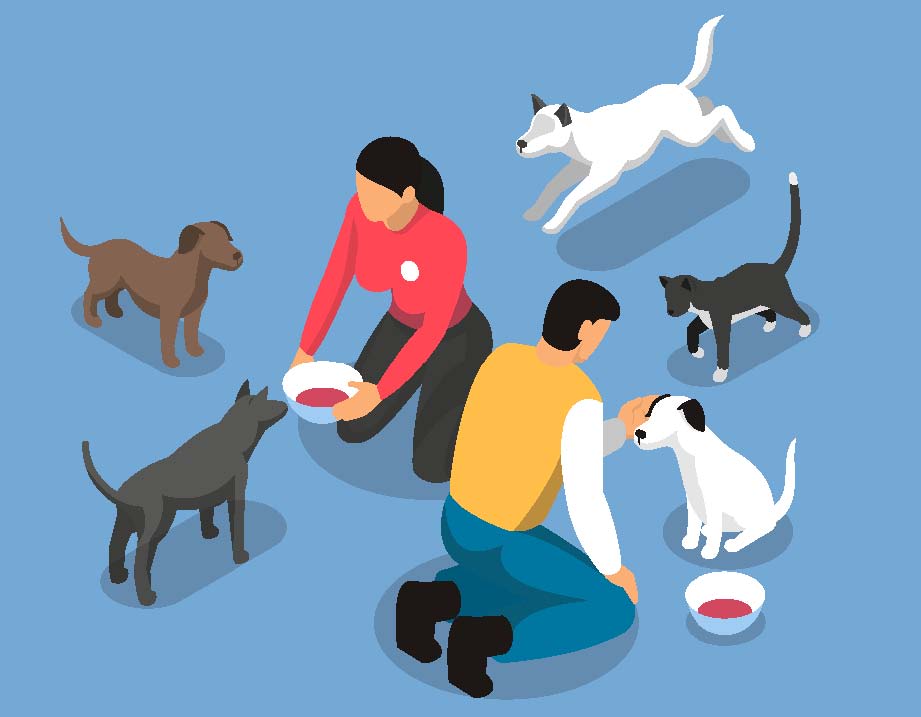People inherently care for animals. We see a dog being beat up by a stranger and we take action to put a stop to the violence. We see a cat trapped on the roof and we sound the alarm.
But why should people care?
Are animals intelligent?
NBC News found that the top 10 smartest animals are chimps, dolphins, elephants, cephalopods, crows, squirrels, dogs, cats, and pigs.

Scientists believe that animals are actually much smarter than people realize. The problem arises when we use human intelligence as a benchmark for animals.
Frans de Waal, a primatologist at Emory University, told The Independent in 2017 that “every species’ operating system is finely tuned to do what they need to do” – and this makes intelligence comparisons pointless. However, he noted that some species are indeed much similar to humans, such as chimpanzees.
Biological balance
We still have a lot to learn about human-animal interactions, but psychologists believe that caring about animals and how they’re treated is significant as they have a major role in the ecosystem.
“When animals die, we die too. Animals are needed for our own psychological well-being and we can learn a lot from them. We are that connected to other beings and that’s why we seek them out when times are tough,” Marc Bekoff, PhD explained in his 2011 article in Psychology Today.
What is animal welfare?
Animal welfare is all about the wellbeing of animals. According to the American Veterinary Medical Association (AVMA), an animal is in a good state of welfare is they’re safe; healthy; comfortable; well nourished; able to express innate behavior; and free from pain, fear, and distress. It involves disease prevention and veterinary treatment, appropriate shelter, management, nutrition, and humane handling.
Animal Welfare in PH

A lot of Filipinos recognize the importance of animals – with some treating their companion animals as members of the family, or even as their own children.
In fact, the Philippine Animal Welfare Society (PAWS) has become one of the most popular non-profit organizations in the Philippines, resulting in the birth of the Philippine Animal Welfare Act (AWA).
Did you know?
PAWS spearheaded the campaign for the Republic Act 8485, also known as the Animal Welfare Act of the Philippines, in 1986. The government was not ready for it at that time, but a revised Animal Welfare Bill was eventually drawn up and diligently pursued by the animal welfare organization in the senate and congress.
On February 11, 1998, the Animal Welfare Act of 1998 was finally signed by then Philippine President Fidel V. Ramos.
Recognizing animal sentience

Does it really matter whether animals have feelings? Does lack of intelligence justify the exploitation and consumption of animals?
Aside from recognizing that animals deserve to be treated better, more and more people around the world are recognizing the personhood of animals – with animal lovers taking the label seriously by leaving animals off their plates and boycotting businesses that exploit or harm animals, emphasizing that there’s no humane way to kill someone who doesn’t want to die.
Animal Welfare Act
According to PAWS, the Animal Welfare Act of 1998 aims to “protect and promote the welfare of all terrestrial, aquatic, and marine animals in the Philippines by supervising and regulating the establishment and operations of all facilities utilized for breeding, maintaining, keeping, treating, or training of all animals either as objects of trade or as household pets.”
More than welfare
A lot of animal lovers admit that animals don’t deserve to be killed for food and vanity. Animal welfare advocates are starting to realize how cruel factory farming could be, not only for the animals but also for the environment.
So, instead of advocating for treating animals better before their slaughter, many advocates now push for for animal-free food as they are good for the health, the animals, and the environment. A 2018 study by Joseph Poore and Thomas Nemecek, published in the journal Science, found that an animal-free diet was the “single biggest way to reduce our environmental impact on the planet.”
Peace begins on the plate
Did you know that an animal-free diet also teaches children that everyone is equal and that no one deserves to be owned?
Mahatma Gandhi, for example, has been known to advocate for an animal-free diet as he believes that eating animals and their secretions is a type of aggression – emphasizing that man’s dominion over all creatures means not to prey upon the latter but to protect them.
This appeared in Animal Scene magazine’s January 2020 issue.
You might want to read:
– The power of pets: Animal companions’ great role in helping people feel less lonely and more connected
– Pet owners rush to buy face masks for their pets over fears of coronavirus
– Which country spends most of its money on pets?




